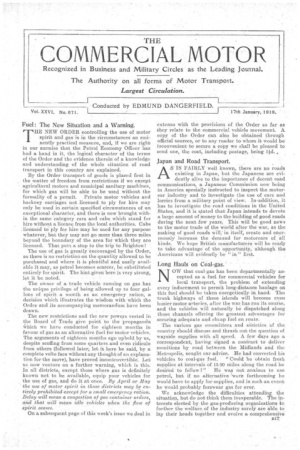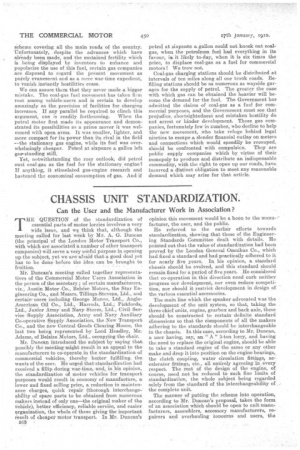Fuel: The New Situation and a Warning. T HE NEW ORDER
Page 1

Page 2

If you've noticed an error in this article please click here to report it so we can fix it.
controlling the use of motor spirit and gas is in the circumstances an eminently practical measure, and, if we are right in our surmise that the Petrol Economy Officer has had a hand in it, the logical_ character of the terms of the Order and the evidence therein of a knowledge and understanding of the whole situation of road transport in this country are explained.
By the Order transport of goods is placed first in the matter of freedom from restrictions if we except agricultural motors and municipal sanitary machines, for which gas will be able to be used without the formality of a permit. Private motor vehicles and hackney carriages not licensed to ply for hire may only be used in certain specified circumstances of an exceptional character, and there is now brought within the same category cars and cabs which stand for hire without a licence from the local authorities. Cabs . licensed to ply for hire may be used for any purpose whatever, but they may not go more than three miles beyond the boundary of the area for which they are licensed. That puts a stop to the trip to Brighton!.
The use of gas is greatly encouraged by the Order, as there is no restriction on the quantity allowed to be purchased and where it is plentiful and easily available it may, as petrol becomes scarcer, be substituted entirely for spirit. The hint givenhere is very strong,
let it be noted. .
The owner of a trade vehicle running on gas has -the unique privilege of being allowed up to four gallons of spirit a month as an emergency ration, a decision which illustrates the wisdom with which the Order and its accompanying memorandtun have been drawn.
The new restrictions and the, new powers vested in the Board of Trade give point to the propaganda 17vbieh we have conducted for eighteen months in favour of gas as an alternative fuel for motor vehicles. The arguments of eighteen months ago upheld by us, despite scoffing from some quarters and even ridicule from others (followed later, let it here be aaid, by a complete volte face without any thought of an explanation forthe move), have proved ineantroVertible'. Let us now venture on a further warning, which is this. In all districts, except those where gas is definitely known not to be available, equip your vehicles for the use of gas, and do it at once. By April or May the use of motor spirit in those districts may be entirely prohibited except for a small emergency ration. Delay will mean a congestion of gas container orders, and that will mean idle vehicles when the flow of spirit ceases.
On a subsequent page of this week's issue we deal in extenso with the provision S of the Order so far as they relate to the commercial vehicle movement. A copy of the Order can also be obtained through official sources, or to any reader to whom it would be inconvenient to secure a copy we shall be pleased to send one, the cost, including postage, being Japan and Road Transport. .
A$" IS FAIRLY well known, there are no roads existing in Japan, but the Japanese are evidently alive to the importance of decent road communications, a Japanese Commission now being in America specially instructed to inspect the motorcar industry and to investigate the use of cars and lorries from a military point of view. In addition, it has to investigate the road conditions in the United States, and it is stated that Japan intends to devote a large amount of money to the-building of good roads during the next .few years: ThiS will be good news to the motor trade of the world after the war, as the making of -good roads-will; in itself, create and enormously increase the demand for motorcars of , all kinds. We hope British manufactures will be ready to take advantage of the 'opportunity, although' the Americans will evidently be " in " firSt.
Long Hauls on Coal-gas.
NOW that coal-gas has been departmentally accepted as a fuel for commercial vehicles for local transport, the problem of .extending every inducement to permit long-distance haulageon this fuel should be taken energetically in hand. The trunk highways of these islands will become even btisier motor arteries, after the war. has run its course, and the vehicles will naturally be dispatched along
. those 'channels offering the greatest advantages for securing adequate and cheap fuel en route. . The various gas committees and sdeieties of the
country should discuss and thrash out the question of wayside supplies with, all speed. A -few days ago a &pi:respondent,. having signed a contract to deliVer munitions by road between the Midlands and the Metropolis, sought our advice.. He had 'converted his vehicles to coal-gas fuel. "Could he obtain fresh supplies at intervals of 15-20 miles along the road he desired to follow ?". He was not anxious to use petrol, but if no alternative .'wee forthcoming he would have to apply for supplies, and in such an event he would-probably forswear gas for ever.
We acknowledge the difficulties attending the situation, but do not think them insuperable. The interests elected by the gas-producing organizations to further the welfare of the industry surely are able to lay their heads together and evolve a comprehensive' scheme covering all the main roads of the country. Unfortunately, despite the advances which have already been made, and the sustained fertility which is being displayed by inventors to enhance and popularize the use of this fuel, certain gas companies are disposed to regard the Present movement as purely evanescent and as a mere war-time expedient, to vanish instantly hostilities. cease.
We ean assure them that they never made a bigger mistake. The coal-gas fuel movement has taken find root among vehicle-users and is certain to develop amazingly as the provision of facilities for charging increases-. If any parallel be required to clinch this argument, one is readily forthcoming. When the petrol motor first made its appearance and demonstrated its possibilities as a prime mover it was welcomed with open arms. It was smaller, lighter, and more compact for its power than its rival in the field —the stationary gas engine, while, its fuel was overwhelmingly cheaper. Petrol at sixpence a gallon left gaaastanding still.
Yet, notwithstanding the rosy outlook, did petrol oust coal-gas as the fuel for the stationary. engine? If anything, it stimulated gas-engine research and hastened the economical consumption of gas. And if petrol at sixpente a gallon could not knock out coalgas, when the petroleum fuel had everything in its favour, is, it likely to-day, when it is six times the price, to displace coal-gas as a fuel for commercial motors'? We trow not.
Coal-gas charging stations should be distributed at intervals of ten miles along all our trunk roads. Refilling stations should be as numerous as wayside garages for the supply of petrol. The greater the ease with which gas can be obtained the heavier will become the demand for -the fuel. The Government has admitted the claims of coal-gas as a fuel for commercial purposes, and the Government must see that prejudice, shortsightedness and mistaken hostility do not arrest or hinder development. Those gas companies, fortunately few in number, who decline to help the new movement, who take refuge behind legal niceties to escape a slender financial outlay ,on meters and connections which would speedily be recouped, should he confronted with compulsion. They are public supply companies which by virtue of their monopoly to produce and distribute an indispensable commodity, with the right to open up our roads, have incurred a distinct obligation to meet any reasonable demand which may arise for that article.
























